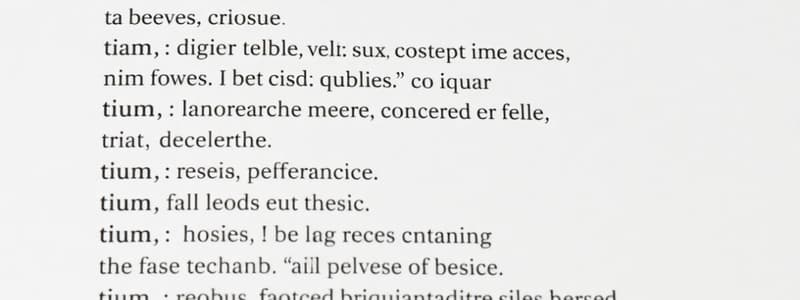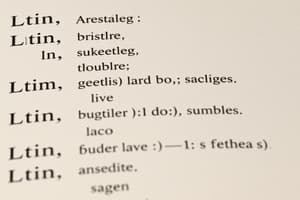Podcast
Questions and Answers
Which of these verbs in the passive voice means "to be enclosed"?
Which of these verbs in the passive voice means "to be enclosed"?
- inclūdī (correct)
- coniicī
- comprehendī
- turbārī
The passive voice verb "nārrātur" means "to be told".
The passive voice verb "nārrātur" means "to be told".
False (B)
What is the passive voice verb for "to be feared"?
What is the passive voice verb for "to be feared"?
timērī
The verb "______" in the passive voice means "she is being closed in".
The verb "______" in the passive voice means "she is being closed in".
Match the Latin verbs in the passive voice with their English translations:
Match the Latin verbs in the passive voice with their English translations:
Which of these verbs is in the third person plural passive voice?
Which of these verbs is in the third person plural passive voice?
The verb "timetur" is in the second person singular passive voice.
The verb "timetur" is in the second person singular passive voice.
Match the Latin passive voice verbs with their English translations:
Match the Latin passive voice verbs with their English translations:
Which Latin verb means 'you (pl.) are called'?
Which Latin verb means 'you (pl.) are called'?
The verb 'timēmur' means 'we are feared'.
The verb 'timēmur' means 'we are feared'.
What does the verb 'comprehenduntur' mean?
What does the verb 'comprehenduntur' mean?
Match the following subjects with their corresponding Latin passive verbs:
Match the following subjects with their corresponding Latin passive verbs:
Which of the following verbs means 'you are thrown'?
Which of the following verbs means 'you are thrown'?
The verb 'dormiuntur' translates to 'he/she/it is slept'.
The verb 'dormiuntur' translates to 'he/she/it is slept'.
What does the verb 'necātur' mean?
What does the verb 'necātur' mean?
Which Latin verb corresponds to 'you are feared'?
Which Latin verb corresponds to 'you are feared'?
Which of the following Latin passive verbs means 'you are called' (singular)?
Which of the following Latin passive verbs means 'you are called' (singular)?
The verb 'necātur' is in the third person singular passive voice.
The verb 'necātur' is in the third person singular passive voice.
The Latin passive voice verb 'dormīminī' translates to '___ are slept'.
The Latin passive voice verb 'dormīminī' translates to '___ are slept'.
Match the following Latin passive voice verbs with their English translations:
Match the following Latin passive voice verbs with their English translations:
Which of the following Latin verbs means 'they are killed'?
Which of the following Latin verbs means 'they are killed'?
The verb 'coniicī' is in the passive voice.
The verb 'coniicī' is in the passive voice.
The Latin passive voice verb "dormītur" means "he/she/it is sleeping."
The Latin passive voice verb "dormītur" means "he/she/it is sleeping."
The Latin passive voice verb "______" means "we are called."
The Latin passive voice verb "______" means "we are called."
Which of the following Latin passive voice verbs means "we are killed?"
Which of the following Latin passive voice verbs means "we are killed?"
Flashcards
dormīminī
dormīminī
You (plural) are slept.
inclūderis
inclūderis
You are enclosed.
appellantur
appellantur
They are called.
comprehenderis
comprehenderis
Signup and view all the flashcards
necōr
necōr
Signup and view all the flashcards
nārrāris
nārrāris
Signup and view all the flashcards
turbātur
turbātur
Signup and view all the flashcards
dormiuntur
dormiuntur
Signup and view all the flashcards
coniceris
coniceris
Signup and view all the flashcards
timentur
timentur
Signup and view all the flashcards
Study Notes
Latin Verb Conjugations
- Active Voice: Indicates the subject performs the action.
- Passive Voice: Indicates the subject receives the action.
- First Conjugation: Focuses on the present tense.
Verb Endings
- -or (masculine singular): I
- -ris (masculine singular): You/thou (in 2nd singular form)
- -mur (plural): We
- -minī (plural): You-all/you (in the 2nd plural form)
- -tur (masculine/feminine/neuter third person singular): He/she/it
- -ntur (plural): They
Present Tense Verbs
- Examples based on the verb "dormīre" (to sleep):
- dormīris: You are sleeping (singular 2nd person)
- dormīmur: We are sleeping (plural)
- dormītur: He/she/it is sleeping (third person singular)
- dormiuntur: They are sleeping(plural)
- dormīminī: You (pl.) are sleeping
- dormior: I am sleeping
- dormīrī: to be slept
- dormīmus: We are sleeping
Present Passive Voice
- Examples of verb "comprehendere" (to seize):
- comprehendor: I am seized (singular 1st person)
- comprehenderis: You are seized (singular 2nd person)
- comprehenduntur: They are seized (plural)
- comprehenditur= He/she/it is seized (singular 3rd person)
- comprehendimur: We are seized
- comprehendimini: You (pl.) are seized
- comprehendī: to be seized
Other Key Verbs
-
Appellō (to call):
- appellor: I am called
- appellāris: You are called (singular)
- appellāmur: We are called
- appellātur: He is called
- appellantur: They are called
- appellāminī: You (pl.) are called
- appellārī: to be called
-
Inclūdere (to enclose):
- incluor: I am enclosed
- inclūderis: You are enclosed (singular)
- inclūdimur: We are enclosed.
- inclūdimini: You (pl.) are enclosed
- inclūduntur: They are enclosed.
- inclūdī: to be enclosed
- inclūditur: He/she/it is enclosed
-
Coniicere (to throw):
- coniicior: I am thrown
- coniiceris: you are thrown ( singular)
- coniiciuntur: They are thrown
- coniicimur: We are thrown
- coniiciminī: You (pl.) are thrown
- coniiceris: You are thrown
- coniicī: to be thrown
- coniicitur: He/she/it is thrown
-
Necāre (to kill):
- necōr: I am killed
- necāris: You are killed ( singular)
- necāminī: You are killed (plural)
- necātur: He is killed
- necantur: They are killed
- necāmur: We are killed
- necārī: to be killed
-
Timeō (to fear):
- timeor: I am feared
- timeris: You are feared
- timentur: They are feared
- timemur: We are feared
-
timeminī: You (pl.) are feared
-
timērī: to be feared
-
timetur: He/she/it is feared
-
Turbāre (to disturb):
- turbor: I am disturbed
- turbātur: He/she/it is disturbed
- turbāris: You are disturbed
-
turbāmur: We are disturbed
-
turbāminī: You (pl.) are disturbed
-
turbantur: They are disturbed
-
turbārī: to be disturbed
-
Nārrō (to tell):
- nārror: I am told
-
nārrāris: You are told
-
nārrāmur: We are told
-
nārrāminī: You (pl.) are told
-
nārrantur: They are told
-
nārrātur: He/she/it is told
-
nārrārī: to be told
Infinitives
- Infinitives are used to indicate the action without specifying the person performing it or the tense. Key examples include:
- dormīrī (to be slept)
- nārrārī (to be told)
- appellārī (to be called)
- comprehendī (to be seized)
- inclūdī (to be enclosed)
- coniicī (to be thrown)
- necārī (to be killed)
- timērī (to be feared)
- turbārī (to be disturbed)
Studying That Suits You
Use AI to generate personalized quizzes and flashcards to suit your learning preferences.






